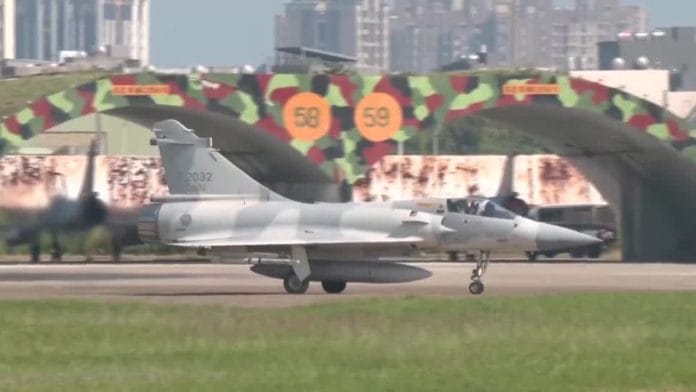New Delhi: China Monday launched a new set of military drills surrounding Taiwan in response to the self-governing country’s President Lai Ching-te’s national day speech last week when he had said the two countries were “not subordinate” to each other.
The Eastern Theatre Command of the People’s Liberation Army (PLA) said Monday that the drill “also serves as a stern warning to the separatist acts of ‘Taiwan Independence’ forces. It is a legitimate and necessary operation for safeguarding national sovereignty and national unity”.
The joint military drill—codenamed “Joint Sword-2024B” and carried out in the cover of darkness—is the second major operation by the Chinese armed forces in recent months, war-gaming a potential invasion of Taiwan with the combined forces of its army, navy, air force and rocket force.
The current drill will see Chinese forces in the north, south and east of the island, with its aircraft carrier Liaoning and supporting ships operating in the east. The PLA’s statement gave no end date, unlike in the previous operation in May 2024. However, there were no live-fire exercises, as per media reports.
Taiwan condemned the military drills in a statement, claiming such actions were “challenging the rules-based international order and gravely undermining regional peace and stability”.
In the statement, the nation’s Ministry of Foreign Affairs (MOFA) called on nations around the world to recognise “China’s authoritarian and expansionist nature”, and “take concrete actions to support democratic Taiwan at this critical moment, unite in defending the values of freedom and democracy, and safeguard the rules-based international order, as well as the freedom, openness, and prosperity of the Indo-Pacific region”.
What did President Lai say?
In his first national day address on 10 October, Lai Ching-te had declared that Taiwan and China were “not subordinate” to each other.
“The Republic of China has already put down roots in Taiwan, Penghu, Kinmen, and Matsu. And the Republic of China and the People’s Republic of China are not subordinate to each other. On this land, democracy and freedom are growing and thriving. The People’s Republic of China has no right to represent Taiwan,” said Lai.
The president added: “The 23 million people of Taiwan, now more than ever, must reach out to our branches to embrace the future… Regardless of what name we choose to call our nation—the Republic of China; Taiwan; or the Republic of China Taiwan—we must all share common convictions: Our determination to defend our national sovereignty remains unchanged.”
While Lai’s speech mainly focused on domestic issues like childcare, healthcare and minimum wage, the above two lines highlighted his approach to issues with Beijing—firstly, that Taiwan was not subordinate to China and secondly, there was “determination” to defend the territory’s “national sovereignty”.
Beijing hit back the same day, with foreign ministry spokesperson Mao Ning reiterating that “Taiwan has never been a country and will never be a country, and thus has no so-called sovereignty”. For Beijing, such declarations are considered to be an effort by Lai and his Democratic Progressive Party (DPP) to seek independence from China.
Also read: Modi takes aim at China at East Asia Summit, calls for ‘development’, not ‘expansionism’
One-China policy
Beijing considers the self-governing territory of Taiwan as a part of its country and will not entertain any notions of its independence. China has not governed the territory since 1949, when the Republic of China (Taiwan’s official name) shifted its administration to the island after the end of the Chinese civil war.
The Republic of China was in control of mainland China since 1912, but gave up control of the territory to the Communist Party of China (CPC), after losing the civil war. In 1949, the CPC announced the foundation of the People’s Republic of China (PRC).
Taiwan continued to represent China in international bodies, as its sole legitimate government, until 1971. The United Nations (UN) recognised the PRC as China’s sole legitimate representative at international fora, thereby reducing the status of Taiwan to a self-governing territory.
Over 180 countries, including India, recognise the “One-China policy” and Beijing as the sole representative of China at international fora. However, many countries continue to maintain diplomatic ties with Taiwan.
Beijing’s actions in DPP tenure
Lai, who won the presidential election in January 2024, led the ruling DPP to a historic third term though the party lost its majority in the Legislative Yuan. He succeeded Tsai Ing-wen who was president from 2016 to 2024.
In the decade since the DPP came to power, Beijing has taken both diplomatic and military action to check its global footprint.
In the last 10 years, Beijing has given close to $2 billion in overseas aid to nine countries, who shifted their diplomatic recognition from Taiwan to China. These countries include Burkina Faso, Panama, El Salvador, Honduras, Nicaragua, Solomon Islands, Kiribati, São Tomé and Príncipe and the Dominican Republic.
Nauru, a Pacific Island nation, shifted its diplomatic recognition from Taiwan to China just after Lai’s election. China’s aid diplomacy has seen the number of countries recognising Taipei fall to 11.
On the military front, just days after Lai’s inauguration in May 2024, Beijing launched “Operation Joint Sword-2024A”—a two-day joint military exercise by the PLA. The aim was to surround the islands around Taiwan. At that time, Beijing had said Taiwan’s independence was a “dead end”.
(Edited by Tikli Basu)






